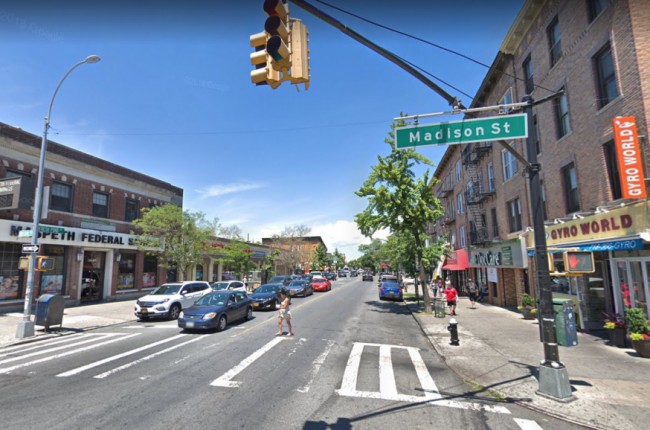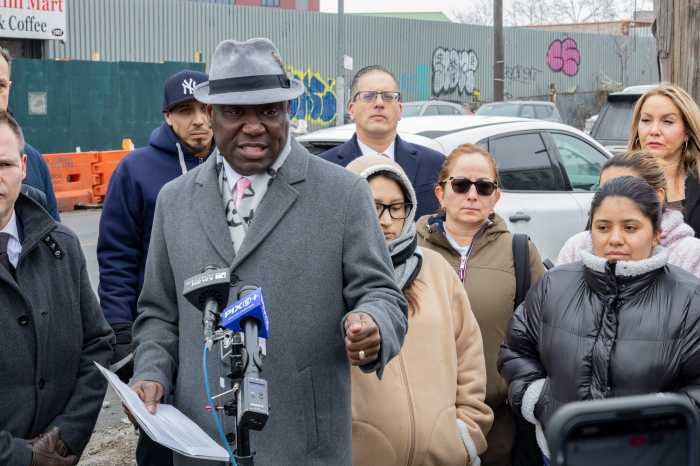
Fresh Pond Road. (Google Maps)
Sept. 19, 2019 By Allie Griffin
A coalition of business owners along Fresh Pond Road and property owners in Ridgewood have taken legal action against the city’s implementation of a bus lane down Fresh Pond Road.
The Department of Transportation began construction of the bus lane in August, despite months of pushback from community members, business owners and local elected officials. The plan will reduce the number of parking spaces, which business owners fear will hurt their bottom line.
Now a group of nearly 30 business owners and the Ridgewood Property Owners and Civic Association have formed an ad hoc coalition and have filed a lawsuit to halt its construction. The lawsuit was filed Tuesday in Queens County Supreme Court.
“We’ve created an informal Fresh Pond Road coalition which includes the civic association and nearly 30 businesses on Fresh Pond Road with more being added basically every day,” Ridgewood Property Owners and Civic Association president Geoffrey Elkind said at a Community Board 5 meeting last night.
The DOT’s contentious plan, part of Mayor Bill de Blasio’s Better Buses Action Plan, will create a designated bus lane southbound along Fresh Pond Road from Bleecker Street to Putnam Avenue which will be open to buses and right turning vehicles only, Monday through Friday from 3 p.m. to 7 p.m.
The lane is meant to alleviate the heavy traffic flow on Fresh Pond Road in the afternoon and evenings when the Q58 bus’s ridership is highest. According to the DOT, buses average a speed of three miles per hour, about the same pace as walking during the peak hours.
The DOT announced the bus lane proposal in April and soon came under fire from Fresh Pond Road business owners who were concerned that the loss of 70 parking spaces to make way for the bus lane would hurt them.
The DOT, however, said it was adding 60 metered parking spots to side streets to counter the loss. Many opponents argued that this would not make up for the lost Fresh Pond Road spaces.
In addition, Elkind said the DOT refused to listen to alternative measures to reduce congestion. For instance, the community board, he said, suggested synching the traffic lights, before constructing a bus lane.
Elkind said legal action was necessary to bring the DOT “to the negotiating table to enact some of these congestion reduction actions.”
“The Fresh Pond Road coalition today [Wednesday] initiated the filing of an article 78 proceeding to adjourn the operation of the bus lane, at least temporarily and to compel the DOT to implement congestion reduction actions which are sorely needed,” he added.
An Article 78 proceeding is used to appeal the decision of a New York State or local agency to the New York courts.
Elkind argued that without traffic reduction measures, the bus lane would fail.
“Basically the plan that they got for their bus lane doesn’t include any real congestion reduction actions,” Elkind said. “In the absence of such actions, this bus lane is most likely to fail, not deliver bus riders any of the promised benefits and potentially cause grave harm to the business community and jobs on Fresh Pond Road.”
However, some groups have spoken out in opposition of the lawsuit.
“The lawsuit filed to stop the bus lane on Fresh Pond Road is frivolous,” said Stephanie Burgos-Veras, Campaign Manager with the Riders Alliance. “It’s unfortunate that a small group of people are trying to block something that would benefit tens of thousands of riders.”
She argued that bus lanes help low-income New Yorkers and blocking their creation blocks their economic opportunity.
“When you block bus lanes, you block access to economic opportunity to bus riders who, on average, make $28K a year and are 86 percent people of color. Bus riders should have priority on New York City streets. This lawsuit should be dropped.”
The DOT did not immediately respond for comment.


































